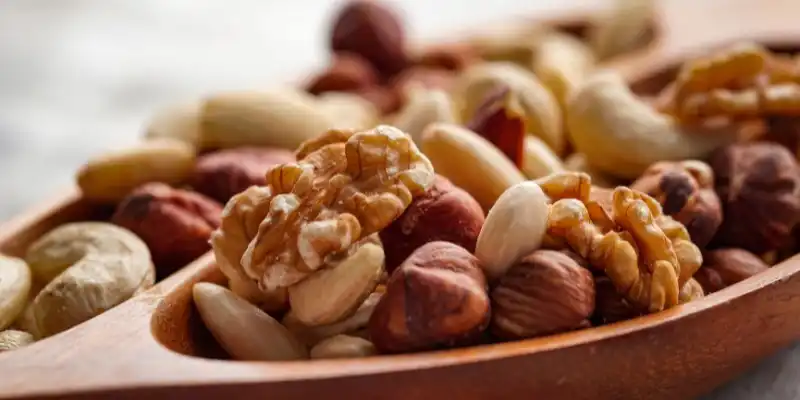Are Nuts Safe for Dogs? – Everything You Need to Know
Published: 16 Jan 2025
Hello, dog lovers!
Imagine you’re relaxing on the couch, snacking on some nuts, when your dog walks over with those irresistible, begging eyes. It makes you wonder—can dogs eat nuts?
Well, the answer isn’t as simple as a yes or no. Think of a nut as a tiny treasure chest—small and unassuming on the outside but packed with valuable nutrients or, in some cases, potential hazards.
Don’t worry, Musky, a veterinarian with over four years of experience, is here to guide you through everything you need to know about nuts and dogs. We’ll break down which nuts are safe, which ones can be toxic, how much is okay, and the best ways to serve them.
By the end of this, you’ll have all the knowledge you need to make the best and safest choices for your pet.
Ready? Let’s get started!
Can Dogs Eat Nuts?
Yes—dogs can eat some nuts, but not all. Only a few types of nuts are safe for dogs and in small amounts, and many can be harmful or even toxic.
Nuts are packed with beneficial nutrients, such as healthy fats, protein, vitamins, and minerals. However, their high-fat content makes them less suitable for dogs, as their digestive systems process fats differently than humans.
Let’s explore some safe and toxic nuts together!
Safe Nuts for Dogs
Here are some nuts you can occasionally share with your dog.
- Peanuts
- Cashews
- English Walnuts
- Pistachios
- Hazelnuts
- Brazil Nuts
- Chestnuts

But remember to consult your vet before and ensure they are prepared properly to avoid any risks.
Toxic or Harmful Nuts for Dogs
Here’s the list of all the nuts that you should avoid at all costs:
- Macadamia Nuts
- Black Walnuts
- Pecans
- Hickory Nuts
- Almonds
- Pine Nuts
- Beech Nuts
- Ginkgo Nuts
- Acorns

Nutritional Benefits of Nuts for Dogs
Nuts can actually be a great treat for your dog—if you pick the right ones. Let’s take a look at the nutritional benefits of nuts for your dog:
- Nuts are packed with healthy fats, which can provide your dog with long-lasting energy and help keep their coat shiny and smooth.
- The protein found in nuts can support your dog’s muscle development, making them stronger and helping with tissue repair after activity.
- The fiber content in certain nuts aids in digestion, promoting regular bowel movements and preventing digestive issues.
- Many nuts contain essential vitamins like Vitamin E, which can help boost your dog’s immune system and keep them healthy.
- Nutrients such as magnesium and potassium found in some nuts contribute to a healthy heart and overall good health.
- The healthy fats and vitamins in nuts can support your dog’s skin, helping to prevent dryness and irritation.
- Nuts contain antioxidants that help protect your dog from harmful free radicals, which can contribute to aging and chronic diseases.
- Nuts contain minerals such as calcium and phosphorus, which can support bone health and keep your dog strong and active.
However, along with all the benefits, they are not ideal snacks for your dog.
Why Nuts are not Always Dog-Friendly?
Nuts might seem like a harmless treat to share—after all, they’re packed with nutrients. But for dogs, nuts can be more trouble than they’re worth. Here’s a closer look at why nuts aren’t always the best snack for your furry friend:
High-Fat Content
Nuts contain a higher amount of fat and calories. While these fats can be healthy for humans, they’re not so great for dogs. Too much fat can lead to obesity and even pancreatitis—a painful and potentially life-threatening condition. You can learn the safe amount of calories for your dog by using our tool:
Here’s a table that includes the fat percentage and approximate calories per ounce (28g) for some common nuts:
| Nut | Fat Percentage | Calories per Ounce (28g) |
|---|---|---|
| Almonds | 50-55% | 160-170 |
| Cashews | 44-46% | 155-160 |
| Peanuts | 49-50% | 160-170 |
| Walnuts | 65-70% | 185-200 |
| Pecans | 70-75% | 190-200 |
| Hazelnuts | 60-65% | 175-180 |
| Macadamia Nuts | 75-80% | 200-210 |
| Brazil Nuts | 65-70% | 185-200 |
| Pistachios | 45-50% | 160-170 |
Choking Hazards
We all have seen how fast a dog can eat a snack. Because nuts are small and hard, they can easily become choking hazards, especially for smaller breeds. Shells and whole nuts can also block a dog’s digestive tract, causing serious problems.
Hidden Toxins in Some Nuts
Various nuts, including Macadamia nuts and moldy walnuts, can cause severe symptoms in dogs, including vomiting, tremors, and even paralysis.
Salt and Additives
Many nuts we buy are seasoned with salt or coated with flavors like chocolate or spices. These extras might taste great to us but are not safe for dogs. Too much salt can lead to dehydration or sodium poisoning, and chocolate is definitely toxic to dogs.
Digestive Sensitivities
Dogs’ stomachs aren’t built to handle certain foods, and nuts can be tough on their digestion. This can lead to uncomfortable symptoms like bloating, vomiting, or diarrhea.
| Vet’s Recommendation! |
|---|
Always prioritize dog-specific treats over human snacks. There are plenty of nutritious and safe treats designed specifically for dogs that offer health benefits without the risks associated with nuts. |
What are The Signs of Toxic Nut Consumption in Dogs?
If your dog eats a harmful nut, it’s important to watch for signs of toxicity or distress. The symptoms can vary depending on the type of nut consumed, but here are some common signs to look out for:
| Signs of Nuts Toxicity |
|---|
|
If you notice any of these symptoms after your dog eats nuts, contact your vet immediately for guidance. In cases of severe symptoms, it’s better to take them to the hospital immediately.
How Much Nuts Does a Dog Need?
Nuts are calorie-dense, meaning just a small amount can quickly add up to excess calories in your dog’s diet. Determining the appropriate amount of nuts for dogs largely depends on the type of nut and the individual dog’s size, health, and dietary needs. As a general guideline, nuts should make up no more than 10% of your dog’s total daily calorie intake.
- Small Dogs: A few unsalted peanuts (about 1-2) or a couple of cashews can be a reasonable treat for small breeds.
- Medium Dogs: Medium-sized dogs may enjoy a handful of peanuts or a few cashews, but it’s best to keep it to about 5-10 nuts.
- Large Dogs: Larger dogs can tolerate a bit more, but even for them, it is advisable to stick to about 10-15 nuts.
It’s also important to monitor your dog for any signs of stomach upset or changes in behavior after giving them nuts. If your dog starts to gain weight or shows signs of digestive distress, it’s best to cut back on the treats. Always remember: when in doubt, consult your veterinarian.
How to Prepare Nuts for Dogs?
Preparing nuts for dogs requires some simple steps to ensure they are safe and healthy for your furry friend. Here’s how to do it:
- Choose safe nuts
- Select unsalted and unseasoned nuts
- Remove shells
- Chop or crush them
- Keep portions under control
- Monitor your dog for adverse reactions
By following these steps, you can safely prepare nuts as a special treat for your dog while ensuring their health and well-being!
Can Puppies Eat Nuts?
No, puppies cannot eat nuts. Their digestive systems are still developing, making them more prone to choking, digestive upset, or even toxicity. It’s best to avoid nuts until they are older.
Conclusion
Ok, fellow pet parent, now you are completely aware that “can dogs eat nuts or not?” Nuts like peanuts, cashews, and hazelnuts can be offered in small amounts, but nuts such as macadamia nuts, walnuts, and almonds should be avoided due to their toxicity or potential to cause digestive issues.
As a veterinarian, I recommend avoiding nuts altogether, even as occasional treats, to eliminate any potential risks. However, if you want to feed your dog nuts, always be mindful of the quantity and type of nuts you offer. Remember that nuts should never replace a balanced, nutrient-rich dog diet.
Have you ever shared nuts with your dog? What was their reaction? Share your experience in the comments below!
Nut butters like peanut butter are safe for dogs in moderation as long as they do not contain xylitol, which is toxic to dogs. Almond butter is also safe in small amounts but should be given sparingly to avoid excess fat or calories.
Yes, there are plenty of dog-friendly treats like carrots, apple slices (without seeds), blueberries, or sweet potatoes. These are safe, nutritious, and low-calorie options that can serve as a healthy alternative to nuts.
Yes, the preparation can impact safety. Roasted nuts often contain added salt, seasoning, or oils, which are harmful to dogs. Raw nuts, though free of additives, can still pose a choking hazard or cause digestive issues. It’s best to avoid both unless they’re unsalted and unseasoned.
Yes, smaller dogs tend to be more sensitive to nuts due to their smaller size and lower tolerance for high-fat foods. While larger dogs may handle nuts better, it’s still important to monitor them to prevent health issues like obesity or pancreatitis.

- Be Respectful
- Stay Relevant
- Stay Positive
- True Feedback
- Encourage Discussion
- Avoid Spamming
- No Fake News
- Don't Copy-Paste
- No Personal Attacks

- Be Respectful
- Stay Relevant
- Stay Positive
- True Feedback
- Encourage Discussion
- Avoid Spamming
- No Fake News
- Don't Copy-Paste
- No Personal Attacks





